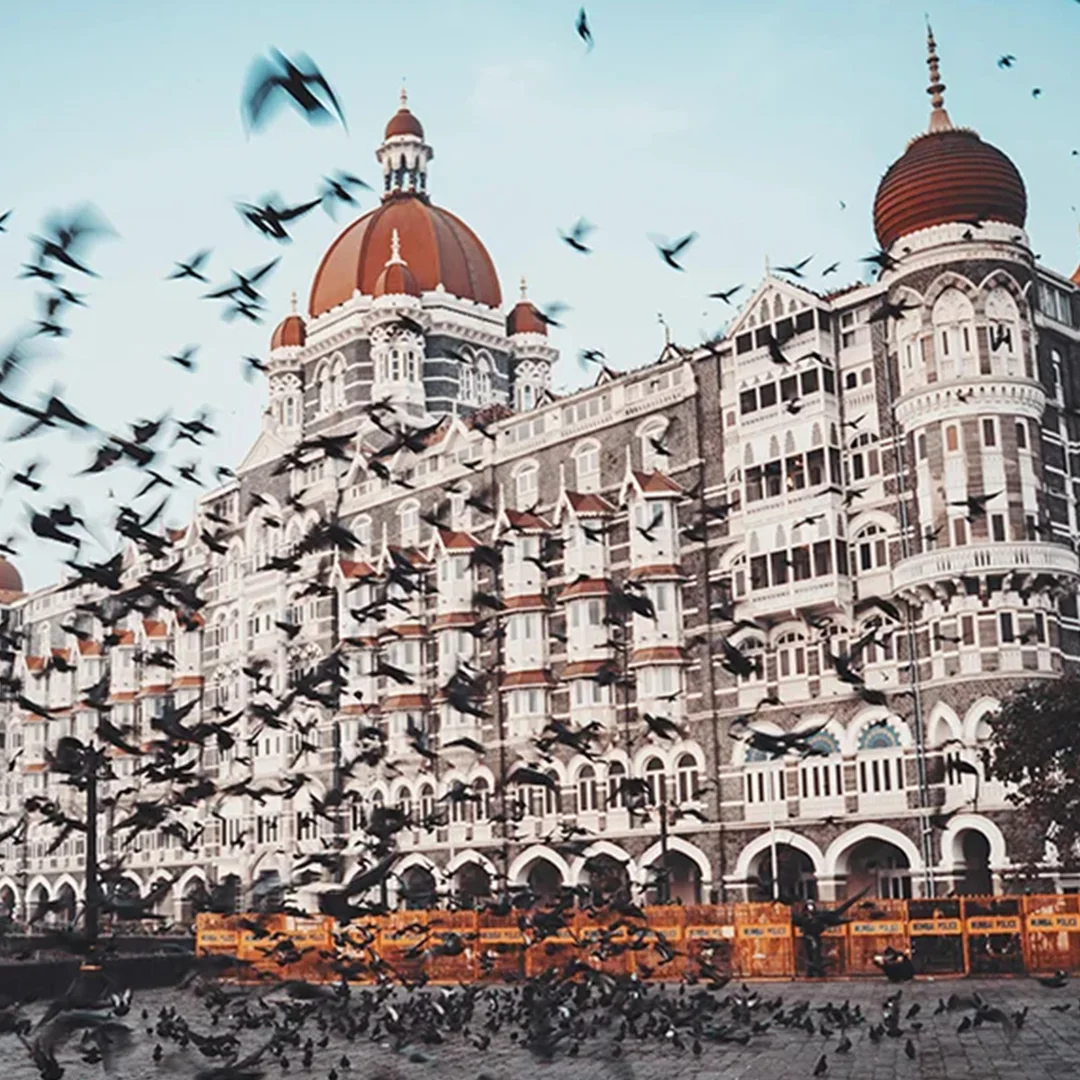Home › Doing business in Mumbai
Learn more about Doing Business in Mumbai
Mumbai, the capital of Maharashtra, is India’s financial, commercial, and entertainment hub. It is home to major business districts such as Nariman Point, Bandra-Kurla Complex (BKC), and Lower Parel. As India’s economic powerhouse, Mumbai offers a diverse, fast-paced market ideal for startups, SMEs, and multinational corporations.
| Population ~20 million |
GDP Contribution Over 30% of national GDP |
Startup Ecosystem ~700 active startups |
| Average Salary ₹60,000/month |
Office Rent (CBD) ₹150–250/sq. ft. |
Key Sectors (Not specified) |
Economic Landscape of Mumbai
1. Key Economic Indicators
Mumbai generated over ₹11.5 trillion in GDP, making it the most economically significant region in India (Ministry of Statistics and Programme Implementation). The city attracts the majority of Foreign Direct Investment (FDI) due to its infrastructure, talent pool, and regulatory advantages.
2. Major Industries in Mumbai
Financial Services: Mumbai is recognized as the financial capital of India, housing critical financial institutions such as the Bombay Stock Exchange (BSE), the Reserve Bank of India (RBI), and numerous national and international banks. The city’s robust financial ecosystem also includes insurance companies, mutual funds, and private equity firms, making it a central hub for investment and capital markets in the country.
Information Technology (IT): Mumbai’s IT sector is experiencing rapid growth, with thriving startup ecosystems and the presence of established tech companies. Tech hubs in areas like Navi Mumbai and Andheri provide infrastructure and support for innovation and digital development, contributing to the city’s increasing role in India’s digital economy.
Entertainment and Media: Mumbai is the epicenter of the Indian film and television industry, popularly known as Bollywood. The city also hosts major media houses and production studios, offering vast opportunities in content creation, distribution, broadcasting, and digital entertainment. This sector plays a significant cultural and economic role in the region.
Real Estate and Construction: Due to increasing urbanization and population growth, Mumbai continues to witness strong demand for residential, commercial, and mixed-use developments. The real estate and construction industry is driven by large-scale infrastructure projects, redevelopment schemes, and foreign investment, making it one of the most dynamic sectors in the city.
Retail and Logistics: As a major commercial hub, Mumbai supports a vast retail network comprising international brands, Indian retail chains, and e-commerce platforms. Its strategic location and advanced transport infrastructure also make it a key logistics and distribution center, linking producers and consumers across the country.
Legal Environment for Businesses
1. Company Registration Process
Setting up a business in Mumbai involves several key steps and registrations. Corporations and partnerships must first register with the Ministry of Corporate Affairs (MCA) via its online portal. Sole proprietorships are required to register with the Registrar of Firms. Businesses must also secure a Permanent Account Number (PAN) and Goods and Services Tax (GST) registration, and obtain licenses like the Shops and Establishment Registration and the Factory License depending on the business nature. The full process can take several weeks to a few months.Learn more about our Company Registration services.
2. Corporate Compliance Requirements
Accounting Standards: Once registered, businesses must submit an annual financial statement, including the Income Tax Return (ITR) and GST returns, and adhere to all regulations under the Indian Companies Act. Regular filings with the Registrar of Companies (ROC) are required for various corporate actions. Tax compliance is managed by the Income Tax Department, and businesses must follow the Indian Financial Reporting Standards (IFRS) for accounting. Explore our Accounting and Tax services for comprehensive support.
3. Taxation Overview
Australia’s taxation system includes several key taxes for businesses:
| ➤ Corporate Income Tax: 25% (or 22% for new manufacturing companies) |
| ➤ Goods and Services Tax (GST): 18% standard rate |
| ➤ Withholding Tax: 10%-30% depending on type of income and recipient |
| ➤ Local Business Taxes: Varies by municipality, typically 1-2% of gross receipts |
| ➤ Capital Gains Tax (CGT): 20% on long-term capital gains |
Political and Regulatory Landscape
1. Government Support for Businesses
The Indian government actively promotes investments through various incentive programs. The Ministry of Commerce and Industry, through the Department for Promotion of Industry and Internal Trade (DPIIT), provides benefits such as tax exemptions, grants, and infrastructural support to businesses in key sectors like manufacturing, IT, and renewable energy. Additionally, initiatives like Make in India and Startup India encourage entrepreneurship and foreign investment. Our Business Visa and Work Permit services can assist you in leveraging these opportunities.
2. Key Regulations to Consider
Intellectual Property: India offers strong intellectual property (IP) protections for trademarks, patents, and copyrights through the Office of the Controller General of Patents, Designs and Trademarks Utilize our Trademark Registration services to ensure your assets are secure.
Labor Laws: Indian labor laws are comprehensive, covering Employment Contracts, working hours, minimum wages, and employee benefits. India’s labor laws are governed by the Industrial Disputes Act and the Shops and Establishments Act. Compliance.
Environmental Regulations: Businesses in Mumbai must comply with regulations set by the Maharashtra Pollution Control Board (MPCB) and the Ministry of Environment, Forests, and Climate Change (MOEFCC), which include waste management and pollution control measures. We offer Business Contracts and Compliance Services to help you meet these standards.
Geographic and Demographic Insights
1. Strategic Location and Infrastructure
Mumbai’s strategic location on the Arabian Sea gives it an advantage in international trade. The city is supported by crucial infrastructure, including:
| ➤ Chhatrapati Shivaji Maharaj International Airport: Mumbai's primary airport and one of India's busiest. It serves over 50 million passengers annually, connecting the city to more than 100 international destinations. The airport also plays a key role in logistics, handling significant air cargo essential for trade and tourism. |
| ➤ Mumbai Port: Mumbai Port is one of India's busiest and most important ports, managing a large share of the country’s cargo traffic. It serves as a vital gateway for international trade, especially in sectors like oil, chemicals, and bulk goods. With deep-water berths and excellent connectivity, it plays a central role in industrial supply chains. |
| ➤ Public Transport Network: Mumbai has an extensive public transport network, including suburban trains, metro lines, buses, and ferries. The suburban railway system is one of the busiest in the world, serving millions of passengers daily. Ongoing projects like the Mumbai Metro and coastal road improvements are set to enhance connectivity and reduce urban congestion. |
2. Workforce and Urbanization
Mumbai has a highly skilled and diverse workforce, with a strong presence of universities and research institutions. The region’s population exceeds 20 million, growing at a rate of around 1.1% annually. With rapid urbanization, Mumbai’s business landscape presents opportunities across sectors such as retail, technology, real estate, and finance.
Property Investment in Mumbai
1. Renting Property
Mumbai’s real estate market offers high demand for rental properties, particularly in business districts such as Nariman Point, BKC, and Andheri. Rental yields in prime locations are competitive, making it an attractive market for property investors.Explore our Property Management services to secure your investment.
2. Buying Property
Purchasing property in Mumbai is considered a stable long-term investment, with consistent price growth in key areas. Foreign investors can buy property in Mumbai, subject to the legal restriction of owning no more than 49% of the land in any given property. Residential apartments, commercial spaces, and mixed-use developments are popular among foreign investors. Learn more about our Property Acquisition Services.
3 Success Stories from Mumbai
1. Pharmarack: Founded in 2015 by Mahesh Vaidya, Pharmarack is a digital platform that provides technology-driven solutions to the pharmaceutical supply chain. The platform connects pharmaceutical companies, wholesalers, and retailers, ensuring efficient inventory management and seamless order processing. Pharmarack has grown to become a key player in India’s pharmaceutical logistics industry. The company’s success highlights how technology can streamline traditional industries and offer innovative solutions to supply chain challenges. Pharmarack continues to expand, impacting the healthcare sector across India.
2. The Moms Co.: The Moms Co., founded in 2017 by Malika and Shankar Prasad, is a Mumbai-based startup focused on providing toxin-free, natural personal care products for mothers and babies. The company offers a range of skincare, haircare, and bath products formulated without harmful chemicals. The Moms Co. quickly gained popularity for its commitment to safety and quality, becoming a trusted brand for parents. The company expanded its product line and is now a leader in the natural personal care market. Its success demonstrates how a niche, consumer-focused approach can lead to rapid growth in an increasingly health-conscious market.
3. Dineout: Dineout, founded in 2012 by Vivek Kapoor, Ankit Mehrotra, and Sahil Jain, is an online restaurant reservation and food discovery platform. Based in Mumbai, Dineout allows users to book restaurant tables, discover new dining experiences, and enjoy exclusive discounts. The company grew quickly due to its innovative approach to connecting restaurants with diners and offering a seamless user experience. Dineout has partnered with thousands of restaurants across India and expanded its services to include events and payments. Its success story shows how a technology-driven platform can disrupt traditional industries like hospitality and dining.
Future Outlook for Mumbai
Economic Forecast and Development Projects: Mumbai’s economy is expected to grow at around 6.2% annually in the coming years. Key infrastructure projects, including the Mumbai Metro expansion and Navi Mumbai International Airport, will enhance the city’s connectivity and accessibility. These projects will open new avenues for businesses in both commercial and industrial sectors. The city continues to attract both local and international investments. The overall development will further strengthen Mumbai’s position as a global business hub.
Challenges and Opportunities: Mumbai faces challenges such as high property costs, regulatory complexities, and infrastructure congestion. However, opportunities abound in sectors like fintech, e-commerce, healthcare, and renewable energy. The growing demand for tech-driven services and products offers ample prospects for innovation. Moreover, Mumbai’s status as India’s financial capital continues to fuel its growth. Entrepreneurs can leverage these opportunities by tapping into the city’s evolving business environment.
By understanding the local landscape and leveraging the right support, entrepreneurs can thrive in this vibrant city. Contact us to start your business journey in Mumbai today.
Ask our Lawyers
Ask your question and receive legal advice from a qualified lawyer
310 client reviews (4.8/5) ⭐⭐⭐⭐⭐
Share information




